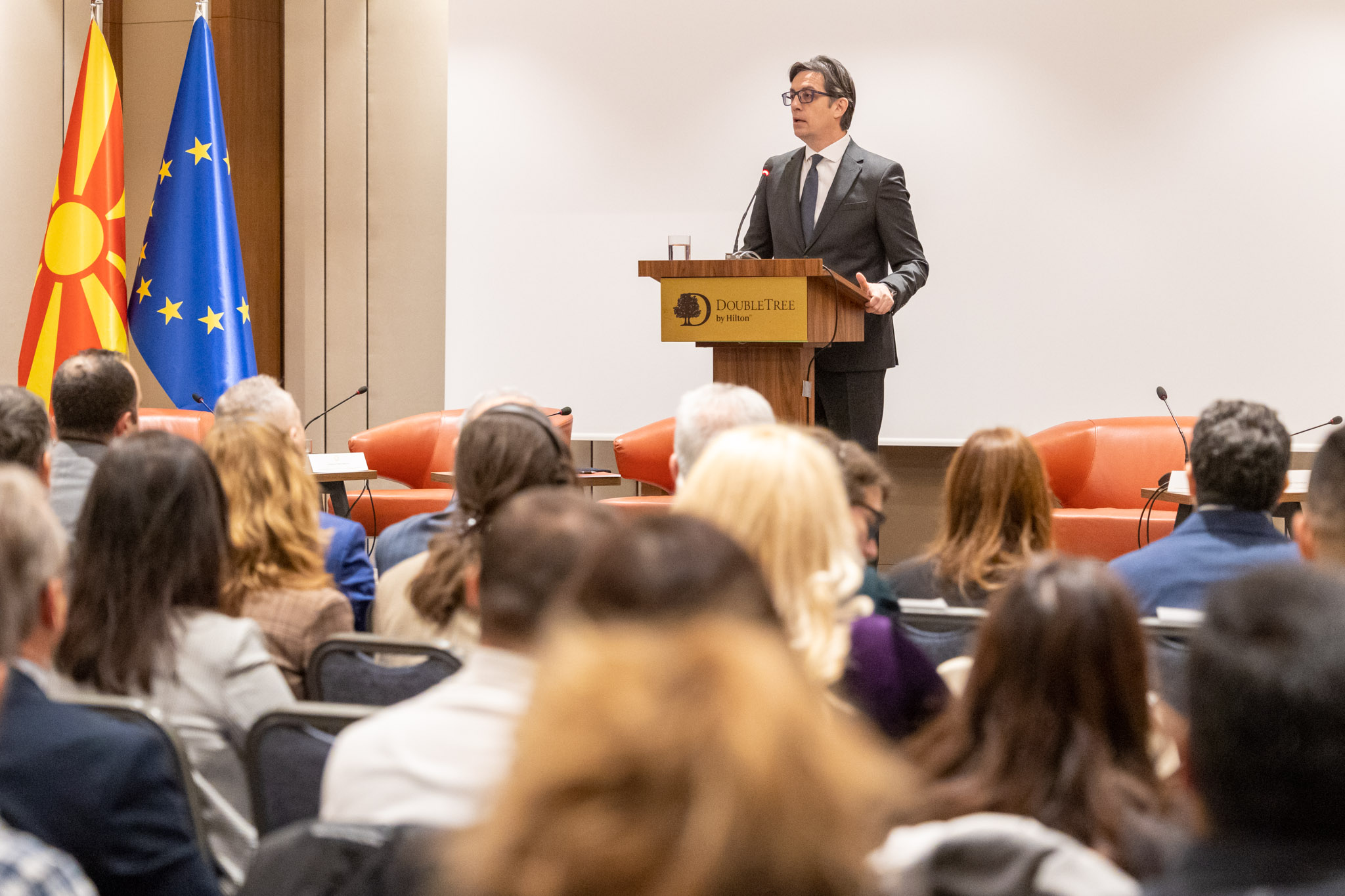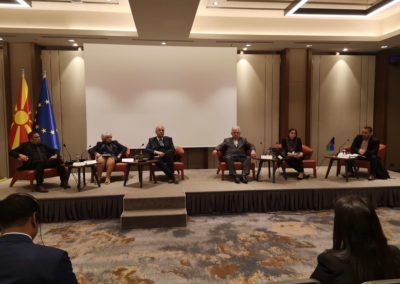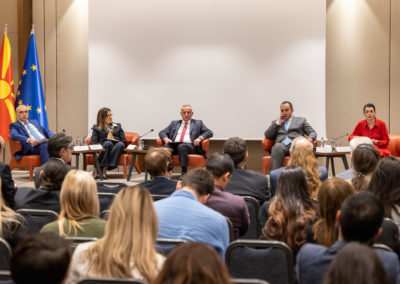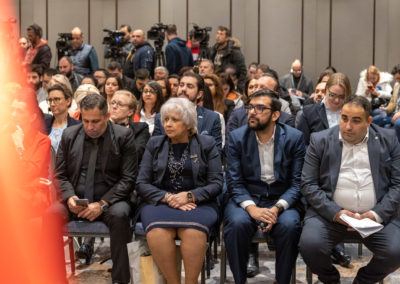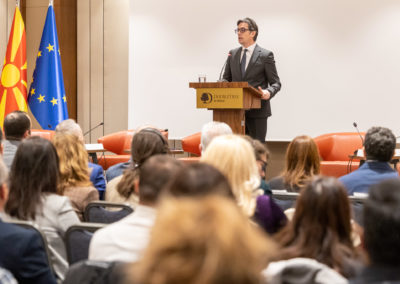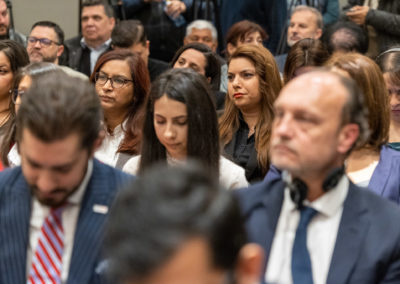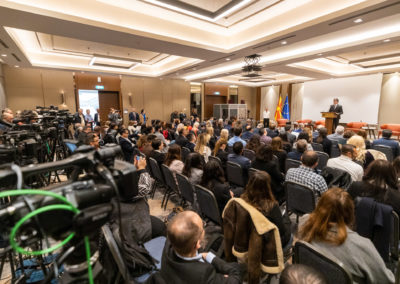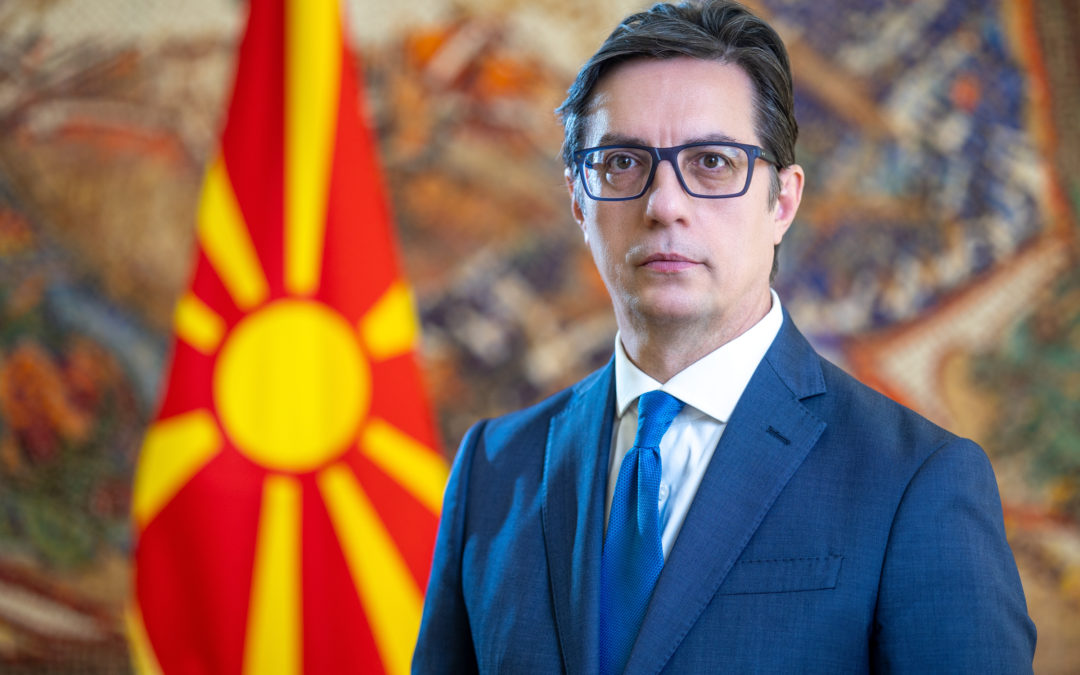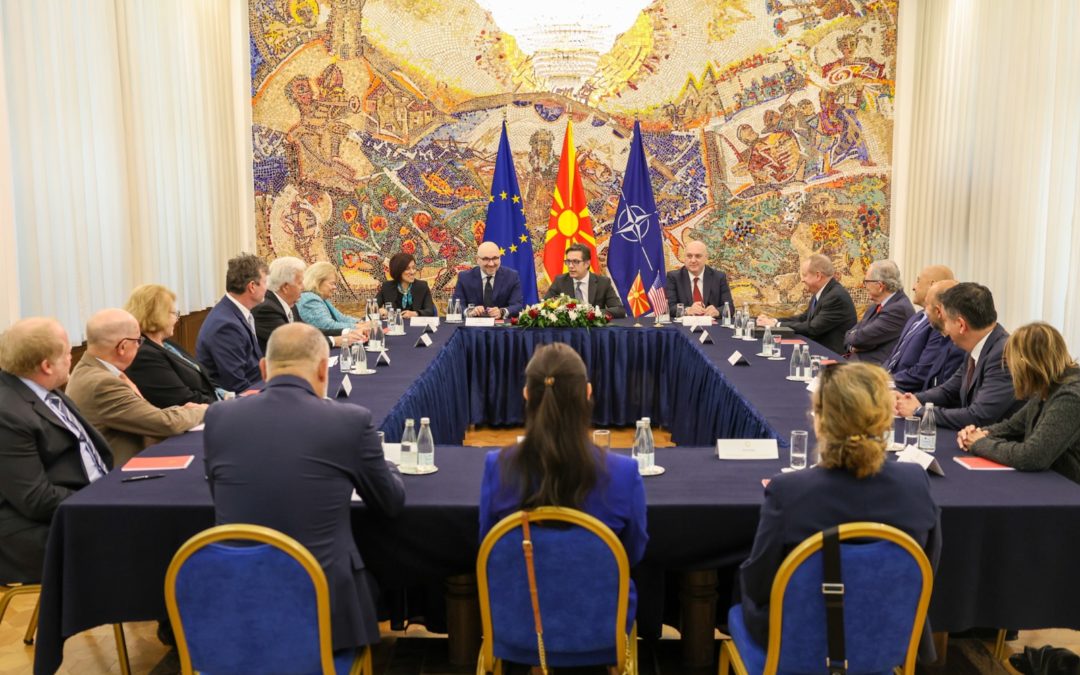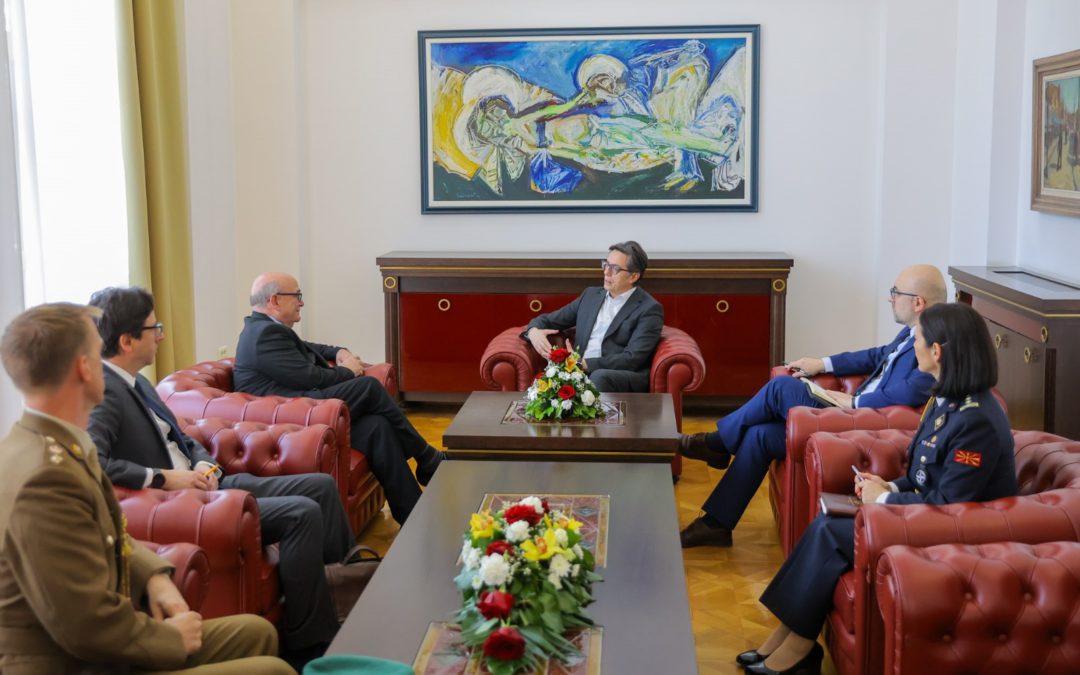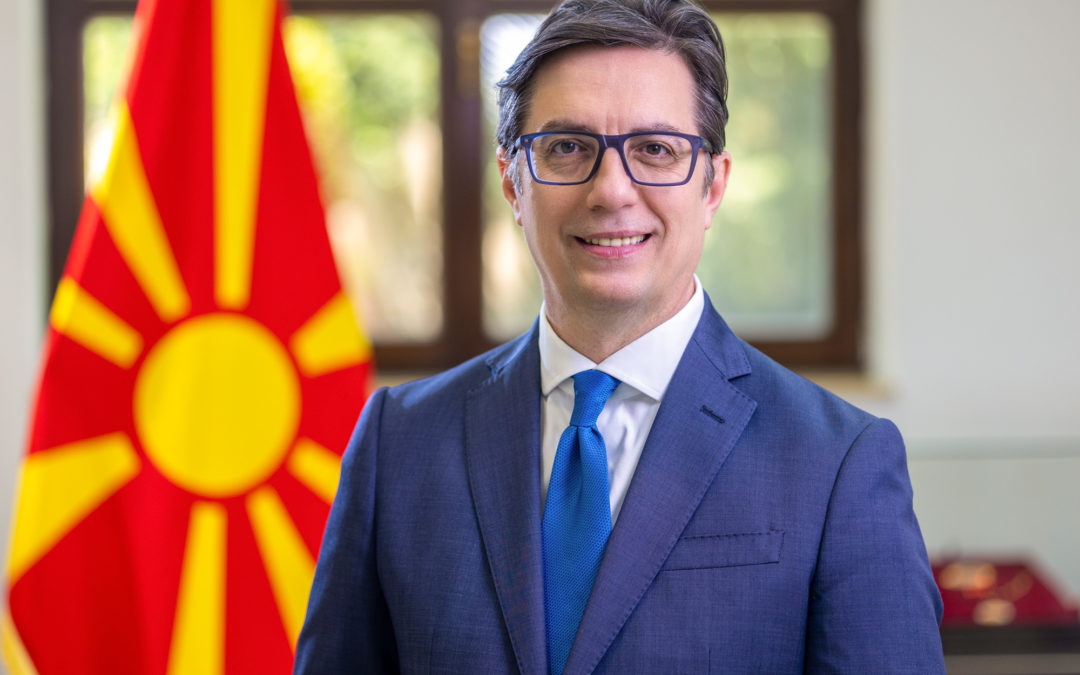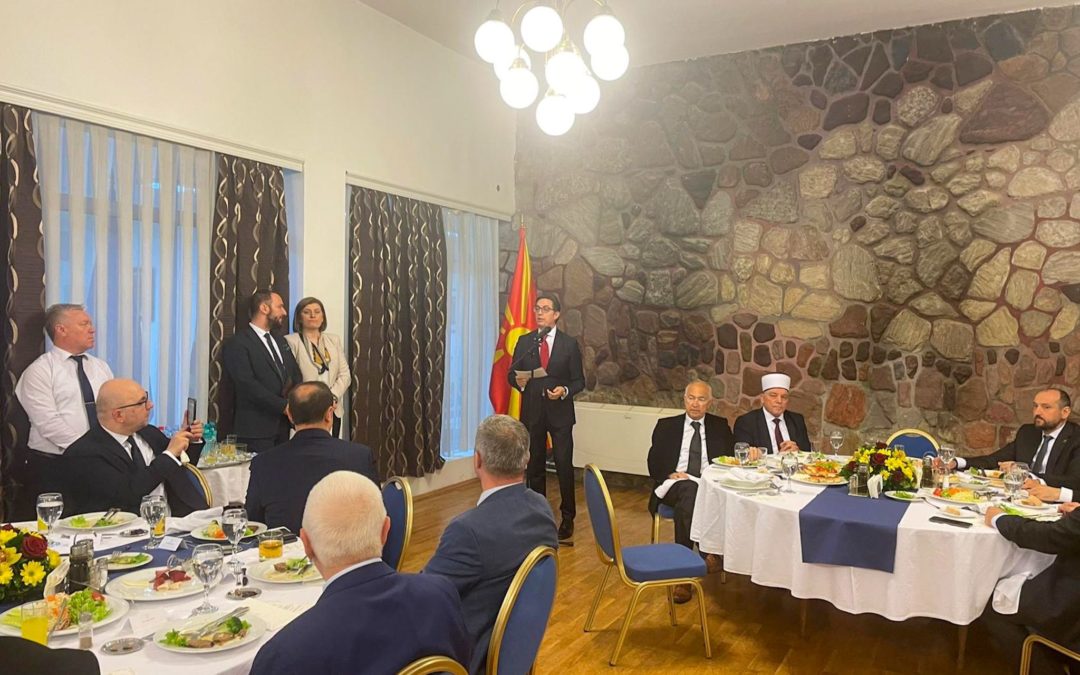President Stevo Pendarovski addressed today the conference “Strategy for Roma, Progress and Next Steps” which was held under his auspices in Skopje, the purpose of which is to identify, through discussion, the efforts and commitments of all relevant stakeholders who are part of the implementation of the Roma Inclusion Strategy 2022-2030, for the course and future steps aimed at achieving measurable and visible results for the improvement of the rights and quality of life of the Roma community in the Republic of North Macedonia.
In his address, President Pendarovski said that although in the region the Republic of North Macedonia is considered a country that makes the greatest efforts to improve the situation of the Roma, however, the modest progress in certain priority areas, among which is education, should not keep us in the comfort zone, because the same problems have been going on for years.
“This was exactly the reason why at the beginning of my term I said that I give my full support for building an environment in which all policy makers, together with citizens, will show proactivity in solving the problems. Today, almost all the relevant actors of this established mechanism of mutual cooperation are present here, and it is our obligation to offer specific solutions”, President Pendarovski said.
The Head of the European Union Delegation in the Republic of North Macedonia, Ambassador David Geer, addressed the event, and the Strategy for Roma 2022-2030 was presented by the Research and Analysis Institute ROMALITIKO.
Within the first panel discussion “Strategy for Roma, Progress and Next Steps”, addresses were delivered by the Minister of Labor and Social Policy, Jovanka Trenchevska, the Minister of Health, Fatmir Medziti, the Minister of Education and Science, Jeton Shaqiri, the Minister of Culture Bisera Kostadinovska Stojchevska and the Deputy Minister of Transport and Communications, Bekim Redzepi.
Mustafa Jakupov, a representative of the Reporting and Information Center for Anti-Gypsyism from Germany, delivered his speech as an intervention on the topic of anti-Gypsyism.
The second panel discussion titled “How the Institutional Setup in the Country Corresponds to the Course and Next Steps of the Roma Inclusion Strategy 2022-2030” was addressed by representatives of institutions and non-governmental organizations, as well as a representative of the Commission for Prevention and Protection from Discrimination.
Below is the full text of President Pendarovski’s address.
Respected citizens,
Esteemed Excellences,
Representatives of the institutions, international organizations, NGO sector and media,
Dear attendees,
In order to encourage social and economic development of the Republic of North Macedonia, it is necessary our strategic priorities to cover the needs of all citizens, guaranteeing a fair start for development of each individual. It will enable building generations that will stay in our country and with, their minds, will contribute to greater development and improved quality of life for everyone equally. Inclusion in the European family requires establishing of a society that is in line with the values of the European Union, such as respect for human rights, the rule of law, a functional market economy, democracy and equality.
The Roma community is an inseparable part of our multicultural mosaic. The worrisome situation in which the majority of the Roma community is has indicated the need to adopt and implement targeted policies in order to overcome that situation. When we talk about the Roma community in the last 3 decades, we most often discuss problems with access to water, electricity, adequate infrastructure and sewage network, to quality education and health services, we talk about unemployment, failure to fulfill the principle of legal representation and limited access to justice. Faced with all these problems, as a state we are establishing a mechanism with targeted and general policies and goals for improving the position of the Roma community. So far we have adopted two strategies for the inclusion of Roma in 2005 and in 2016, we have adopted national action plans, and last year we adopted the new Strategy for the inclusion of Roma 2022-2030.
This mechanism showed a modest result because there are many structural deficiencies that affect the daily cultural and social life of the Roma community. The reports of the European Commission have indicated several times that the national action plans are not fully implemented, or that there is limited progress. The latest Annual Report on the State of Human Rights for 2022 of the US State Department indicates that the basic human rights of Roma who are not recorded in the birth registers cannot be enjoyed. There are a number of shortcomings and challenges due to the exclusion of the Roma settlements from the general and detailed urban plans of the municipalities. Challenges include transition from primary to secondary education, short life expectancy of the Roma, infant mortality rate and poor access to social and health services.
Unfortunately, there is still intolerance towards anything that is different from the majority in the education system, with emerging examples of segregation in schools. The Roma still do not have an institution to promote and nurture the rich Roma culture. Roma women suffer multiple discrimination and face gender barriers. The lack of textbooks for the optional subject “Roma language and culture” indicates a limitation of the right of Roma students to study in their mother tongue. Antigypsyism, as a result of the complex historic process of violence, stigma, hate speech and discrimination, leads to exclusion of the Roma ethnic community from social development flows. These structural disadvantages, like a domino-effect, set back generations, whose social course affects the overall prosperity of the community, and thus the prosperity of our country.
Although in the region the Republic of North Macedonia is considered to be the country that makes the greatest efforts to improve the situation of the Roma, however, the modest progress in certain priority areas, including education, should not give us comfort because we notice that the same problems persist for 3 decades. This is the reason why at the beginning of my term I said that I openly give my support for an environment in which all policy makers together with citizens will show proactivity to solve the problems, which I believe that in today’s discussions the panelists will emphasize again and will find solutions for them. Today, almost all the relevant stakeholders of this established mechanism of mutual cooperation are present here so that we can all fulfill our obligation together and make maximum use of our capacities and competences in this regard.
Ladies and Gentlemen,
We need to face the facts. The old lessons should make us reconsider the processes and previous practices that have shown only a modest result in improving the situation of the Roma community. It is highly important to establish a functional inter-institutional coordination and set-up, monitoring and evaluation of the activities related to the achievement of the goals of the Roma Inclusion Strategy 2022-2030. At the same time, it is most important to allocate a budget for Roma policies and have political will and commitment, which will be real and not declarative, in order to achieve progress in advancing the rights of the Roma community and their quality of life, and thus the prosperity of the Republic of North Macedonia.
We, the politicians, following the European values among all other values, have an obligation to create an equal chance for prosperity for all citizens, for equality and for respecting the rights of minorities and their fundamental rights. We still have a lot of work to do in this area and that is why my support for improving the situation of the Roma community remains. On this occasion, I want to publicly thank all the stakeholders involved in the creation of the new Roma Inclusion Strategy 2022-2030. I wish you a successful discussion, clarification of dilemmas and successful cooperation of all relevant actors in order to have an oriented and focused course and future plans for the successful implementation of the goals of the new Roma Inclusion Strategy 2022-2030.
Thank you.

